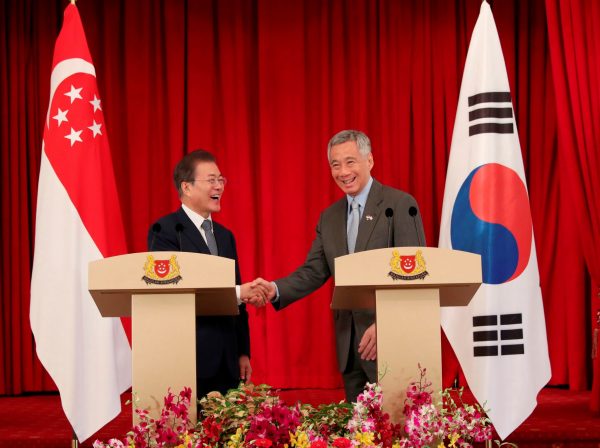Seoul’s recent interest in the Indo-Pacific concept reflects long-standing foreign policy priorities. Dating back to the 1990s, but more clearly and consistently since the Lee Myung-bak years from 2008–13, South Korea has sought to become a middle power with foreign policy interests beyond Northeast Asia. President Lee sought to make Seoul a more prominent player and balancer in East Asia. Afterwards, president Park Geun-hye launched the Eurasia Initiative to involve South Korea in Eurasian connectivity projects.
Under current President Moon Jae-in, South Korea is prioritising Southeast Asia and India as much as Eurasia. Moon’s New Southern Policy — an effort to increase economic and cultural cooperation with ASEAN, and economic and security cooperation with India — is a key tenet of his administration’s foreign policy. Moon himself has already visited Singapore and Vietnam twice and India, Indonesia and the Philippines once since taking office in May 2017.
Originally conceived as a commercial endeavour, the economic component of the policy has recently increased in strategic significance due to discussions with the United States regarding South Korean participation in Washington’s Free and Open Indo-Pacific strategy. The Trump administration wants South Korea to sign up to the infrastructure, energy and development projects that it plans to implement throughout the region.
South Korea is likely to join some of these projects on an ad-hoc basis for the same reasons that it decided to join the Asian Infrastructure Investment Bank. Seoul sees the benefits of improving economic conditions in the Indo-Pacific as it seeks to find new markets for its goods and services. These projects also present chaebols and other South Korean companies with investment opportunities in a region with vast infrastructure needs. But Seoul is unlikely to sign up to each and every project. The Moon government does not want to be seen as simply following Washington’s lead.
The situation becomes more complex when it comes to security considerations in the Indo-Pacific. In November 2017, President Donald Trump suggested that South Korea should participate in his Free and Open Indo-Pacific strategy during a meeting with Moon. But Seoul did not sign up to the strategy. Tellingly, the meeting’s official joint statement attributed the stated importance of the US–South Korea alliance to the Indo-Pacific to Trump only.
From Seoul’s perspective, participation in security initiatives led by the Quadrilateral Security Dialogue (Quad) run the risk of antagonising China. In common with most countries in neighbouring ASEAN, South Korea does not see the need to take sides in the China–US strategic competition. Certainly, the alliance with the United States remains a linchpin of South Korean foreign policy. But, for Seoul, this does not mean joining initiatives that could alienate China.
Instead, Seoul sees its security role in the Indo-Pacific much as it sees security cooperation with India: based on ad-hoc diplomatic support for non-controversial security initiatives. This explains why South Korea recently became a dialogue partner of the Indian Ocean Rim Association. The association is a diplomatic initiative aimed at fostering dialogue and cooperation, including in the areas of maritime security and disaster risk management. In other words, no country is being targeted by the association, whether explicitly or implicitly. This suits the Moon government.
This does not mean that the South Korean navy will not be deployed to the Indian Ocean under any circumstances. In October 2018 the South Korean navy reaffirmed its commitment to developing a blue water naval fleet. And the South Korean anti-piracy Cheonghae unit has been part of multilateral efforts to fight piracy off the coast of Somalia since March 2009. As a rule of thumb, multilateral operations approved by the United Nations Security Council (in other words, by both the United States and China) are likely to count South Korea in.
But there are no real prospects for South Korea becoming a formal and full-fledged member of the Quad in the short term, even if only for security discussions. Absent significant escalation from Beijing, such as blocking trade routes through the South China Sea, Seoul sees little benefit in potentially antagonising China by joining permanently. Not to mention ever-present tensions with Japan that make Seoul hesitant to join any security initiative that includes Tokyo.
In the absence of an explicit Indo-Pacific strategy, Seoul’s New Southern Policy and behaviour in the Indian Ocean serve to demonstrate South Korea’s approach to the region. This approach is based on participation in economic projects that suit Seoul’s needs, support for truly multilateral initiatives and prevention of any perceived antagonism towards China. South Korea does not see the benefits of taking sides in the Indo-Pacific and will not do so absent a major provocation from Beijing.
Ramon Pacheco Pardo is KF-VUB Korea Chair at the Institute for European Studies of Vrije Universiteit Brussel and Reader in International Relations at King’s College London.

